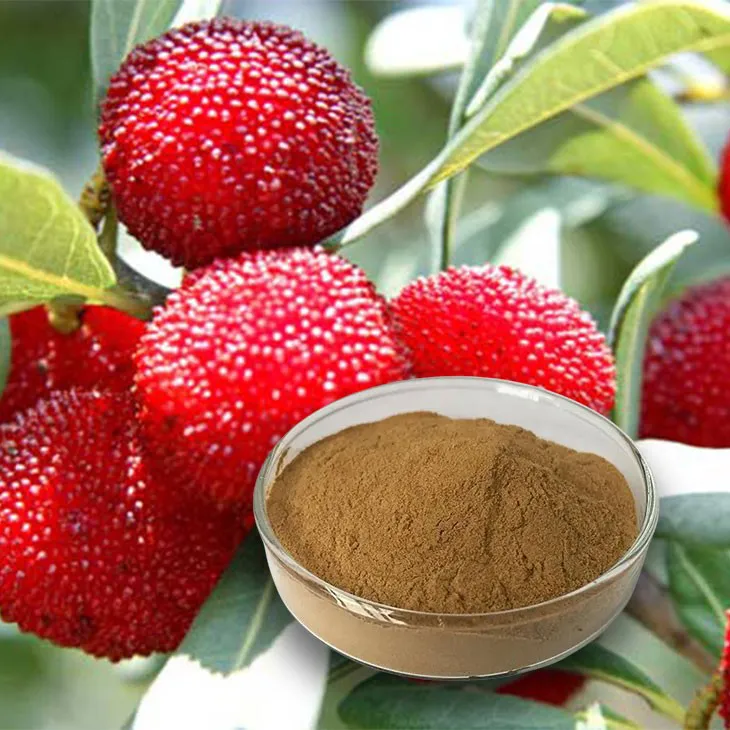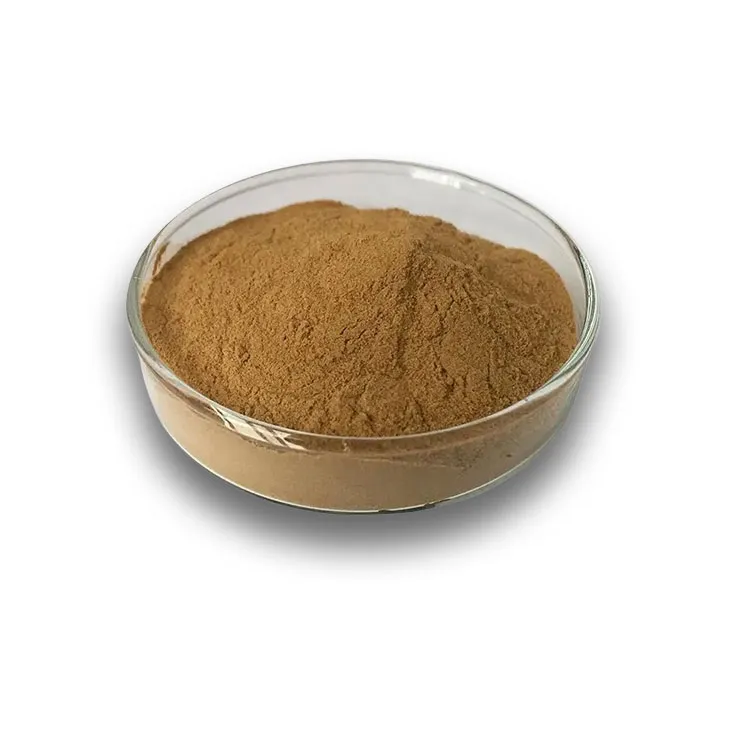- 0086-571-85302990
- sales@greenskybio.com
Does bayberry extract have benefits for diabetes? Are these all safe and applicable for diabetic patients?
2024-11-13

1. Introduction
Diabetes mellitus is a chronic metabolic disorder that has reached epidemic proportions globally. It is characterized by hyperglycemia (elevated blood glucose levels) due to either insufficient insulin production (type 1 diabetes) or ineffective insulin utilization (type 2 diabetes). Management of diabetes typically involves lifestyle modifications, such as diet and exercise, along with pharmacological interventions to control blood glucose, blood pressure, and lipid levels. In recent years, there has been an increasing interest in natural products and their potential benefits for diabetes management. Bayberry Extract is one such natural product that has been the subject of scientific investigation regarding its potential role in diabetes.

2. Bayberry and Its Constituents
Bayberry (Myrica rubra) is a fruit-bearing shrub native to Asia. The fruit, bark, and leaves of the bayberry plant have been used in traditional medicine for various purposes. Bayberry Extract contains a variety of bioactive compounds, including phenolic acids, flavonoids, and tannins. These constituents are thought to be responsible for the potential health - promoting effects of Bayberry Extract.

3. Potential Benefits for Diabetes
3.1 Glycemic Control
One of the key aspects of diabetes management is maintaining proper glycemic control. Some studies have suggested that bayberry extract may have a positive impact on blood glucose levels. In vitro and animal studies have shown that certain components of bayberry extract may enhance insulin sensitivity or stimulate insulin secretion. For example, flavonoids present in bayberry extract may interact with cellular signaling pathways involved in glucose uptake and metabolism. However, it is important to note that while these pre - clinical studies are promising, human clinical trials are still limited in this regard.
3.2 Lipid Metabolism
Diabetic patients are often at an increased risk of abnormal lipid profiles, which can contribute to cardiovascular complications. Bayberry extract has been investigated for its potential effects on lipid metabolism. Some research has indicated that it may help in reducing triglyceride levels and improving the ratio of high - density lipoprotein (HDL) to low - density lipoprotein (LDL). The phenolic compounds in bayberry extract may play a role in lipid regulation by influencing hepatic lipid synthesis and secretion.

4. Safety Considerations
4.1 Adverse Reactions
Although bayberry extract is generally considered a natural product, it is not without potential side effects. Some individuals may experience allergic reactions to bayberry extract, especially those with a history of allergies to related plants. Symptoms of an allergic reaction may include skin rashes, itching, swelling, and in severe cases, difficulty breathing. Additionally, excessive consumption of bayberry extract may cause gastrointestinal discomfort, such as nausea, vomiting, and diarrhea.
4.2 Long - term Use Implications
The long - term safety of bayberry extract in diabetic patients is not well - established. There are concerns regarding potential cumulative effects on the liver and kidneys, as these organs are involved in the metabolism and excretion of the bioactive compounds in bayberry extract. Moreover, bayberry extract may interact with medications commonly used in diabetes management, such as hypoglycemic agents. These interactions could potentially lead to altered drug efficacy or increased risk of adverse effects.
5. Current State of Research
As of now, the research on bayberry extract and diabetes is still in its early stages. Most of the available studies are pre - clinical, using cell lines or animal models. While these studies provide valuable insights into the potential mechanisms of action, human studies are crucial for determining the actual efficacy and safety of bayberry extract in diabetic patients. There have been a few small - scale human trials, but more large - scale, well - designed clinical trials are needed to draw definitive conclusions.
6. Dietary Considerations
For diabetic patients considering the use of bayberry extract as a complementary approach to diabetes management, it is important to incorporate it into a balanced diet. Bayberry fruits are rich in carbohydrates, so portion control is essential to avoid excessive carbohydrate intake. Also, it should not be used as a substitute for established diabetes medications or lifestyle modifications. Instead, it could potentially be used as an adjunct therapy under the guidance of a healthcare professional.
7. Conclusion
In conclusion, bayberry extract shows some potential benefits for diabetes in terms of glycemic control and lipid metabolism based on pre - clinical studies. However, its safety, especially in long - term use and in combination with diabetes medications, remains a concern. Diabetic patients should be cautious when considering the use of bayberry extract and should always consult with their healthcare providers before starting any new supplement. Further research, particularly large - scale human clinical trials, is urgently needed to fully understand the role of bayberry extract in diabetes management and its overall safety profile.
FAQ:
Question 1: What are the potential benefits of bayberry extract for diabetes?
Bayberry extract may have several potential benefits for diabetes. It might play a role in glycemic control by potentially influencing insulin sensitivity or glucose uptake in cells. Some studies suggest it could also have an impact on lipid metabolism, which is often disrupted in diabetic patients. However, more research is needed to fully understand and confirm these effects.
Question 2: How does bayberry extract affect glycemic control?
There are different proposed mechanisms for how bayberry extract may affect glycemic control. It could interact with cellular pathways involved in glucose transport and metabolism. For example, it might enhance the activity of certain enzymes related to glucose utilization. But again, this is still an area of ongoing research, and not all mechanisms are fully understood yet.
Question 3: Is bayberry extract safe for all diabetic patients?
Not necessarily. While there may be potential benefits, individual responses can vary. Some diabetic patients may be more sensitive to the components in bayberry extract. Additionally, those with pre - existing medical conditions or taking other medications may be at risk of adverse reactions. For example, if a diabetic patient has a kidney disorder, the safety of using bayberry extract may be a concern as the body's ability to process and excrete its components could be affected.
Question 4: What are the possible adverse reactions of bayberry extract in diabetic patients?
Some possible adverse reactions could include digestive issues such as nausea, vomiting, or diarrhea. There may also be allergic reactions in some individuals, especially those with a history of allergies to plants in the same family as bayberry. In addition, if bayberry extract interacts with medications that diabetic patients are taking, it could lead to unexpected side effects or changes in the effectiveness of those medications.
Question 5: Can bayberry extract be used long - term for diabetes management?
The long - term safety and efficacy of bayberry extract for diabetes management are not well - established. While short - term use may show some promising effects, long - term use could potentially lead to unforeseen consequences. For instance, there may be cumulative effects on the body's organs or systems over time. Continued research is required to determine if it can be safely used for long - term diabetes management.
Related literature
- The Potential of Bayberry in Metabolic Disorders"
- "Bayberry Extract and Its Impact on Glucose Homeostasis"
- "Safety Considerations of Herbal Extracts in Diabetes: A Focus on Bayberry"
- ▶ Hesperidin
- ▶ Citrus Bioflavonoids
- ▶ Plant Extract
- ▶ lycopene
- ▶ Diosmin
- ▶ Grape seed extract
- ▶ Sea buckthorn Juice Powder
- ▶ Fruit Juice Powder
- ▶ Hops Extract
- ▶ Artichoke Extract
- ▶ Mushroom extract
- ▶ Astaxanthin
- ▶ Green Tea Extract
- ▶ Curcumin
- ▶ Horse Chestnut Extract
- ▶ Other Product
- ▶ Boswellia Serrata Extract
- ▶ Resveratrol
- ▶ Marigold Extract
- ▶ Grape Leaf Extract
- ▶ New Product
- ▶ Aminolevulinic acid
- ▶ Cranberry Extract
- ▶ Red Yeast Rice
- ▶ Red Wine Extract
-
Mangosteen extract powder
2024-11-13
-
Beta Carotene
2024-11-13
-
Lotus leaf extract
2024-11-13
-
Avocado Extract Powder
2024-11-13
-
Yam Extract
2024-11-13
-
Dandelion Leaf Extract
2024-11-13
-
Artichoke Extract
2024-11-13
-
Hops Extract
2024-11-13
-
Calendula Extract
2024-11-13
-
Wheat Germ Extract
2024-11-13





















